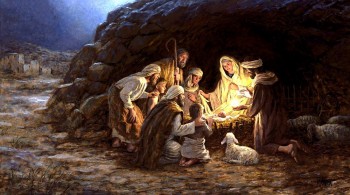Hidden Springs, VA. In the days following the horrific events in Newtown, a theological debate has arisen, a debate that goes well beyond theoretical musings and gets to the heart of a profound issue: Where was God? It’s a reasonable question. If God is all-powerful and if He is a God of love, then why didn’t he stop Adam Lanza?
Mike Huckabee has weighed in. As has James Dobson. And Joseph Farah at World Net Daily. Huckabee suggested that this sort of thing isn’t surprising since we’ve systematically removed God from the public square, including banning prayer from public schools. Dobson claimed that the event in Newtown was an instance of God’s judgment for abortion and gay marriage. Farah suggested that this is simply the logical consequences of secularism and that we should expect more Sandy Hooks not fewer.
It is quite natural, in the wake of tragedy, to seek explanations. The horrific nature of evil is terrifying, and we seek explanations as a way of keeping it at bay. If we can explain it, we can deal with it, for what could be more intolerable than a world of unharnessed, untamed evil?
One way of coping with evil is to assert, like some have, that the act is a direct consequence of rejecting God or promoting a particular policy that offends Him. There are, of course, good reasons to believe that God, being just, punishes evil. It is, however, a more tenuous leap to claim that any particular event is an instance of God’s judgment.
Furthermore, the slaughter of innocents seems at least an elliptical sort of judgment. If God is going to punish the guilty, surely he could find someone more deserving than children. Were the innocents slaughtered in Bethlehem so many years ago an instance of God’s judgment? Or were they killed because of the fear and insecurity of a wicked king?
Looking for meaning–even if that is divine judgment–in tragedies is not unusual, but such activity carries the distinct possibility of claiming too much, for presuming to know the mind of God is a tenuous endeavor. Furthermore, it is easy to point a finger and say that a tragedy that doesn’t directly touch us is an instance of God’s judgment whereas it is less natural to point to suffering in our own lives and come to the same conclusion. We’re more inclined then to acknowledge that God makes the rain to fall on the just and the unjust. Why are we easier on ourselves?
In either case, however, there is a recognition that evil is somehow an instance of disorder. We know that things shouldn’t be this way. Something has gone wrong, but the remedy eludes us, so we attempt to explain. We pretend to know more than we know.
Yet the question remains: where was God? Why did He turn his back on those little children and their teachers on that horrible December day? This question is not new. One born around this time many years ago implored his father with the same agonizing query. “My God, my God, why have you forsaken me?” This was not a theoretical question, for this man dying a slow and agonizing death. He was being executed on a cross. And when he cried to heaven with the question that invariably comes when suffering is profound, God was silent.
Christ, the incarnate son of God, understands the mystery of suffering from the inside, if you will. He is no stranger to the agony of the human condition. During this Christmas season, when we celebrate the birth of a child even as we mourn the loss of twenty beautiful children and more, let us recall that the manger points to the cross. But the suffering of the cross was not the end of the story, for that tragedy was eclipsed by the miracle of the resurrection.
Immanuel. God with us.
Peace on Earth is our prayer.













Well said, brother! As much as I rationally understand our LORD’s reminder in Jn. 16:33, that in this world we will have trouble (and, God be praised, He has ultimately overcome the world!), incidents like this jar me back into the unsettling reality of just how bad, how profound our (my!) sin is. I all too often behave as if Jesus came mainly to sacrifice Himself for albeit imperfect, yet in the main, nice people, who are just a little confused and need enlightenment. Sure, you have the occasional spectacular redemption stories of the thief on the cross, the drug dealer, or the serial adulterer, but these are the exceptions that prove the rule, and most of us really aren’t that bad, right? That the seeds of far worse lie deep within me, waiting for just the right conditions to spring forth into something worse than annoyance at my wife or the other driver who doesn’t perform according to my standards, never entirely occurs. Indeed, this world, although there are hints and tastes of something far better, is worse than I can possibly imagine.
I don’t suppose that if it were my wife or child that had been killed, I would be satisfied with a lot of theological talk; I would need the love, comfort, and peace that only God can ultimately provide. But when we do come to a time when we can reflect, we do well to remember that the Child is the gift that promises far more than some transient and cosmetic “cure” for what ails us; He will not be pleased with half-measures. He came to save us from ourselves, down to the very core of our being, to restore us and this world of His to the wholeness and freedom that He originally intended. Until then, we and the creation groan with a longing only He can and will fulfill.
Even so, LORD Jesus, quickly come!
Good words, Mark. Thank you!
It is a dangerous game to interprete divine Providence since God’s ways are inscrutable.
Jesus, as I recall, was asked this same question in Luke 13. His reply was quite different from Dobson, Farah and Huckabee, “Unless you turn to God, you, too, will perish.”
More religious BS. A simpler more logical explanation is that there is no god, no supreme being watching over us … Humans are responsible for their owns actions, good, bad or ugly and maybe we should stop looking up at the sky for answers …
Norm,
To whom are humans responsible for their own actions? In that context, what is good, bad or ugly that one should be mindful of it?
The consequence of the fall must play itself out, ever downward and in decay and chaos as God’s wrath unfolds against it; the resolution of the Incarnation must likewise play against the fall with mercy, grace and redemption, ultimately with God’s will being done on earth, His good but fallen creation, as it is in heaven, thus our prayer. The killing tares must grow with the life-giving wheat. What else can be said?
I think we are in danger of falling into the cult of the child. Everywhere you hear abour the innocence of children. Any parent knows children are sinners too. They learn to lie almost as soon as they learn to talk, they will hit their sister, steal candy and toys. . . You get the idea. Of course they may be relatively innocent, compared with adults but they are not absolutely innocent.
In any case, it is presumptous to speak for God when he judges. Only a called prophet may do so and we haven’t had one of those since the death of the last apostle.
Typically peoples conception of God is much too small. He didn’t go on a coffee break last week, he works ALL things according to his will. It is our privelege to trust Him.
Children are sinners, but they are not culpable for their sins; that is the sense in which they are “innocent.” It has nothing to do with the cult of the child. The Church, after all, has beatified the “Holy Innocents.”
The most helpful thing I’ve ever read on the “where was God?” question is David Bentley Hart’s little book The Doors of the Sea.
Norm says there is no God but can he explain to me how all this got here? No Atheist can and has be able too, really the most staunch Atheist is a agnostic. I am a Deist, I don’t put much store in “revealed religion”. While I credit Christianity with helping build civilization and form morality I can’t take the Bible seriously. The reason why is it is littered with contradictions, historical inaccuracies, scientific fallacies etc. that just don’t pan out. I am not belittling Christians in anyway, I take the Bible as a metaphor and not literal. That being said I don’t know if God has a will or just set this all in motion. I frankly do believe we have free will and he leaves it up to us to make choices whether for good or bad. He isn’t the one that “allows thing to happen” we make choices and Adam Lanza decided to do evil. Really in my opinion that is all it was , it wasn’t “God’s punishment” or “will”.
“Furthermore, the slaughter of innocents seems at least an elliptical sort of judgment. If God is going to punish the guilty, surely he could find someone more deserving than children. Were the innocents slaughtered in Bethlehem so many years ago an instance of God’s judgment? Or were they killed because of the fear and insecurity of a wicked king?”
Excellent response to Dobson. What we had in Sandy Hook was much more akin to a modern day Herod than the judgment of God. We have become a nation of wicked kings and queens who slaughter innocents daily at the altar of consent.
“More religious BS. A simpler more logical explanation is that there is no god, no supreme being watching over us … Humans are responsible for their owns actions, good, bad or ugly and maybe we should stop looking up at the sky for answers …”
Then why waste your time here?
“I frankly do believe we have free will and he leaves it up to us to make choices whether for good or bad. He isn’t the one that “allows thing to happen” we make choices and Adam Lanza decided to do evil. Really in my opinion that is all it was , it wasn’t “God’s punishment” or “will”.”
Can it be the case that both we have free will and that God (or deity) has free will as well?
I echo Rob G. The Doors of the Sea is essential reading after a tragedy as intense as Sandy Hook. I’ve taken to posting this little quote every time the “Where is your God now?” and “This is how God punishes us” articles flare up in the wake of disaster:
“It is difficult to tell sometimes, in the wake of a great disaster, whether those who hasten to announce whatever greater significance they find in the event are moved more by an urgent moral need to sow light in the midst of darkness or by a kind of emotional and rhetorical opportunism, which takes the torments of others as an occasion of the reiteration of one or another set of personal convictions.”
It may seem strange for a “man of faith” to say so, but I sympathize with Norm. As Mark points out even the Son of God cried out for answers in the face of evil’s consequences.
The quotation Alex gave is likewise highly relevant. To put it in a context we all will experience, “Do we take a casserole to the home of grieving family because we care about them, or because we know it expected?” I figure we all struggle with purity of motive.
Thanks for a good article and conversation.
Howard
Comments are closed.